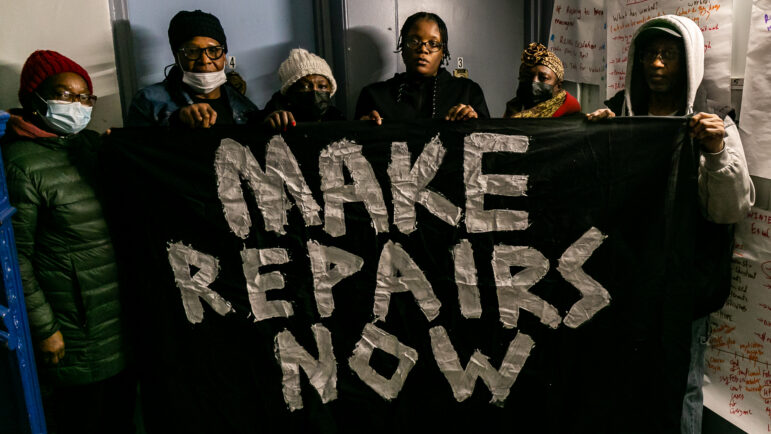“Vulnerable New Yorkers are suffering from predatory landlords, an overburdened court system, and an economy that continues to sideline them. They deserve better from their city.”

Adi Talwar
Tenants organizing for repairs at a building in Brooklyn in 2023.At the height of the COVID pandemic, laws were passed that aimed to protect New York tenants from eviction. The temporary suspension of landlords’ rights to evict obviously became a hot button issue for property owners, and a much needed relief for New York families.
Without these protections, things would have been much worse for under-employed and unemployed renters, resulting in a domino effect on the economy and homelessness. So why did it take a pandemic to prompt such protections when the same barriers to housing security existed long before and, even now, after the pandemic?
Despite sky-high rents, we are witnessing a determination to recover what landlords are considering pandemic “losses.” This greed-fueled resentment is driving landlords toward both legal and illegal tactics. Housing disputes are becoming increasingly common. Community resources to help tenants, as well as the housing court system, are overloaded with claims.
While it should be a vital resource within our judicial system, housing court has become inaccessible and unaffordable to New Yorkers. To make matters worse, more and more housing court lawyers are burning out and switching to other areas of the law.
Tenants are often forced to take time off of work to enforce the terms of their own lease amid landlord negligence. In some cases, delays in repairs or abatement are actually a health risk to tenants. Mold, mildew, rodent and cockroach infestations are common complaints in family court. Whether the delays are caused by an overburdened system, or a complainant’s inability to afford to take off work to attend a court hearing, having to sacrifice your physical health or livelihood is not an acceptable dilemma to be forced into.
As a renter in Sunset Park, it took me a long time to find an apartment that I could afford and one that was big enough for me and my five children. In the eight years that we’ve lived here, our landlord has not repaired or invested in our apartment. I have asked my landlord to bring in an exterminator due to the cockroach and rat infestation to no avail.
After we’d had enough, I filed paperwork at family court in an attempt to force our landlord to comply with the lease. I was extremely disappointed to find out that my claims were unenforceable because our apartment was considered “illegal.” Not only is our landlord gaming the system in maximizing illegal rental space, but now there is no mechanism to enforce my rights as a tenant and to keep my family safe.
My story is not an uncommon one. That is why we need good cause eviction, which forces landlords to prove the necessity of a rent increase and gives tenants the ability to challenge petty, discriminatory, or retaliatory evictions. We need to prevent corporate landlords from maximizing their profits using loopholes in the law. And we need genuine housing court reform to protect tenants’ rights to legal recourse.
Center for Popular Democracy, alongside affiliates, is building a national alliance of renters across the country, including New York, to call for tenant-owned, permanently affordable green social housing and a social housing authority at the state level to solve our country’s housing crisis.
As a member of their affiliate organization, Churches United for Fair Housing (CUFFH), I’m joining this fight. Vulnerable New Yorkers are suffering from predatory landlords, an overburdened court system, and an economy that continues to sideline them. They deserve better from their city.
Claudia Valdivia is a tenant Leader member of Churches United for Fair Housing (CUFFH). Although originally from Mexico, she considers herself a New Yorker by choice.








